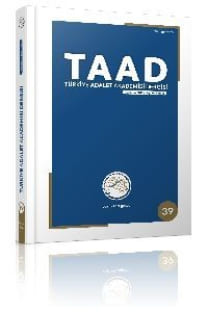POSTCONFLICT TOPLUMLARDA BM'NIN DEMOKRATİKLEŞMEYE KATKISI VE SINIRLARI
BM günümüzde insani nedenler ve güvenlik politikası nedenleri ile sadece yeniçatışmaları önlemeye değil, aynı zamanda çatışma sonrası güvenliği sağlamaya veekonomiyi yeniden canlandırmaya yönelik siyasi kurumların inşası misyonlarını yerinegetirmektedir. BM örgütü evrensel karakteri nedeni ile postconflict toplumlara siyasigelişmelerinde yardım sunma potansiyeline sahiptir. Makalede çok sayıda BM misyonunun ümit edildiği şekilde başarı getirmediğine,bununla beraber evrensel bir örgüt olarak BMnin bu çerçevede demokrasiyienstrüman olarak kullanmaktan öteye giden bir olanağa sahip olmadığına ilişkintartışmalara ışık tutulmaktadır.
Contribution to Democratization and Limits of UN in Postconflict Societies
At the present time UN undertakes the missions of construction of politicalcorporations for not only prevent new conflicts but also provide the post conflictsecurity and reinvigorate the economy by the reason of humanitarian reasons andsecurity policy. UN organization has accommodation potent to post conflict societiesfor their political developments because of universal character.This article sets light to discussions on failure of UN mission at will. However UNhas not another opportunity beyond democracy instrument in this framework as auniversal organization.
___
- Albert Otto Hirschman On-and-Off Connection between Political and Econo- mic Progress, The American Economist Review 84 (1994). Anne Orford Reading Humanitarian Intervention, 2003. Bruno Simma The Charter of the United Nations: A Commentary, 2nd ed. 2002 Charles T.Call/Susan E.Cook On Democratization and Peacebuilding, Global Governance 9 (2003) Edeard Newman UN Democracy Promotion: Comporative Advantages and Constraints, bknz.: E.Newman/R.Rich (Hrsg.), The UN Role in Promoting De- mocracy: Between Ideals and Reality, 2004 Gregory H.Fox International Law and the Entitlement to Democracy After War, Global Governance 9(2003) Gerry Simpson Great Powers and Outlaw States, Cambridge 2004 Gregory H.Fox/Brad R.Roth Introduction: The Spread of Liberal Democracy and its Implications for International Law, bknz.: G.H.Fox/B.R.Roth (Hrsg.), De- mocratic Governance and International Law, Cambridge University Press 2000 Hilary Charlesworth Law After War, MelbJlIntLaw. 8 (2007) Louis Henkin The International Bill of Rights, 1981 Michael W.Doyle Kant, Liberal Legacies, and Foreign Affairs, Philosophy and Public Affairs, Vol. 12, No.3 (1983), Niels Petersen Demokratie als teleologisches Prinzip. Zur Legitimität von Sta- atsgewalt im Völkerrecht, 2009 Oisin Tansey Regime Building, Democratization and International Administra- tion, 2009, Philipp Dann The Internationalization of the Constituent Power of the Nation, bknz.: Hauke Brunkhorst (Hrsg.), Demokratie in der Weltgesellschaft, 2009 Roland Rich UN Guidance Note on Democracy (special Document), Journal of Deocracy, Vol 21, No.2 April 2010 Robert Jackson Sovereignty at the Millenium, 1999 Sujit Choudhry Old Imperial Dilemmas and the New Nations-Building: Cons- titutive Constitutional Politics in Multinational Politics, Coun.L.Rev.37 (2004- 2205) Shahar Hameiri Capacity and Its Fallacies: International State Building as State Transformation, Millenium-Journal of International Studies 38 (2009) Simon Chesterman Just War Just Peace? Humanitarian Interventions and In- ternational Law, 2000 Simon Chesterman Imposed Constitutions, Imposed Constitutionalism, and Ownership, 37(4) Connecticut Law Review (Summer 2005 Thomas Carothers The End of the the Transition Paradigm, Journal of Democ- racy 13 (2002), 5.Vol. Thomas Martin Franck The Emerging Right to Democratic Governance, AJIL 86 (1992)
- ISSN: 1309-6826
- Başlangıç: 2010
- Yayıncı: Türkiye Adalet Akademisi
Sayıdaki Diğer Makaleler
MEDENI MUHAKEME HUKUKUNDA KARŞI DAVA
ANAYASA MAHKEMESİNDE BİREYSEL BAŞVURULARIN İ NCELENME USULLERİ
ASKERI PERSONELİN SORUŞTURMA VE YARGILAMA USULÜ
KLASİK TOPLUMSAL SÖZLEŞME TEORİLERİNİN YÖNETİM B İÇİMLERİNE ETKİSİ
TÜRK HUKUKUNDA GERİ VERME KURUMU VE USULÜ
Pertaining to Access to IT Systems
Non-Muslims In Islam-Ottoman Family Law
TÜRK TICARET KANUNU VE YENI TÜKETICININ KORUNMASI HAKKINDA KANUN AÇISINDAN HAKSIZ TICARI UYGULAMALAR
